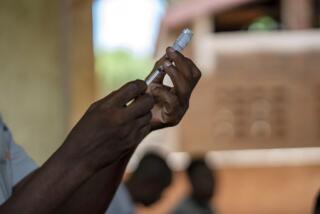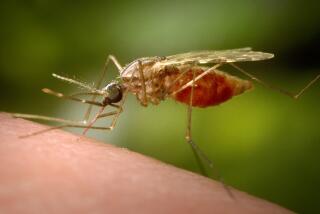Malaria Vaccine Fails Key Test on Children in Thailand
- Share via
A highly touted malaria vaccine that had proved partially effective in earlier clinical trials has failed a new test in Thailand, dashing hopes that health authorities might begin making inroads against a tropical scourge that kills as many as 2.5 million people worldwide each year and disables 100 times that number.
Previous studies had suggested that the vaccine, made of synthetic proteins, might reduce the incidence of malaria by about 30%. But the new test on children in the Shoklo refugee camp showed no benefit at all, British and American researchers report today in the international medical journal Lancet.
On the heels of a negative trial in Gambia and borderline positive results in a trial in Tanzania, “we just don’t see any justification for further trials with this vaccine,” Dr. D. Gray Heppner, of the Armed Forces Research Institute of Medical Sciences in Bangkok, said in a telephone interview from the Thai capital.
The findings will produce “a considerable lowering of confidence” in the vaccine, the journal’s editors conclude in the same issue.
The vaccine was developed by Dr. Manuel Elkin Patarroyo, director of the Institute of Immunology in Bogota, Colombia. Called SPf66, the vaccine is made up of four chemically synthesized proteins that mimic the structure of proteins produced by the malaria parasite while active in the human bloodstream.
When injected into a human being, the synthetic proteins stimulate the body to produce antibodies against the parasite, Patarroyo and his supporters believe.
Patarroyo sold the patent rights to the vaccine last year to the World Health Organization for $1 and will not profit personally if it is a success.
Tests conducted in South America by Patarroyo have indicated that the vaccine reduces outbreaks of malaria by about 30%--not perfect protection by any means but enough to significantly reduce morbidity from the disease. But critics have charged that the trials were poorly organized and that the perceived benefits were statistically insignificant.
The Thai trial, which Heppner called “the most thoroughly planned, best executed study to date,” was designed to determine once and for all whether the vaccine works. Such a test is particularly important because malaria is much more widespread in Thailand than in South America and because strains there are more resistant to drugs.
In a group of 1,221 children ages 2 to 15, the team vaccinated half with the full three doses of SPf66 and immunized the other half with a hepatitis B vaccine as a control. Fifteen months later, 195 people in the vaccinated group developed malaria, compared with 184 cases in the group that received the hepatitis vaccine. “The vaccine had no effect,” Heppner said.
Several other potential vaccines are in the pipeline. Patarroyo himself is developing an updated version of SPf66 that researchers hope will be more likely to provoke an immune reaction.
More to Read
Sign up for Essential California
The most important California stories and recommendations in your inbox every morning.
You may occasionally receive promotional content from the Los Angeles Times.













